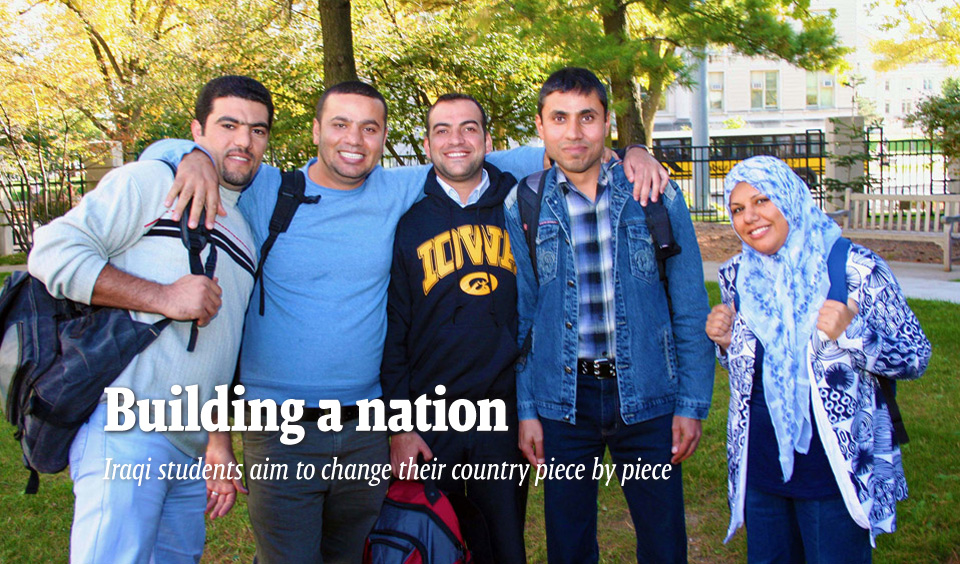-
Page Navigation Links:
- Skip to Site Navigation Links
- Skip to Features

- The University of Iowa
- Spectator
- Monthly News for UI Alumni and Friends
As an international educator, Scott King constantly looks for ways to impact change in higher education. Rarely, however, does an opportunity like this come along.
Through the Iraq Education Initiative, King, assistant dean of International Programs and director of the Office of International Students and Scholars at The University of Iowa, and his colleagues nationwide are helping Iraq become a full member of the global academic community.
The UI welcomed five Iraqi doctoral students—Adnan Abdulwahib (mathematics), Khalid Al-Gharrawi (chemical engineering), Sabah Enayah (biology), Diar Ibrahim (petroleum geosciences), and Mohand Nada (immunology)—to campus last August. Three more Iraqi graduate students joined them this semester.
King was among a delegation of 22 U.S. educators who traveled to Baghdad in January 2009 at the invitation of Iraqi Prime Minister Nuri Al-Maliki to attend the Iraq Education Initiative Symposium. The students’ arrival in Iowa City was an outgrowth of this trip.
“This is an opportunity for us to be a leader,” King said. “We were the only Big Ten university that sent a representative to Iraq. That gives us a chance to actually to take some leadership in this and make a name for the institution.”
Top scholars
In fall 2010, an estimated 80 students representing the “cream of the crop” of Iraqi scholars were placed at universities across the country.
The Iraqi government pays for the students’ tuition, living expenses, and medical insurance with the stipulation that they return home after graduation to help rebuild Iraq’s higher-education infrastructure. The students, who were selected through highly competitive process based on merit, will work for the government for the same amount of time they study abroad.
Ibrahim came to the United States by himself without family by his side to live out his life’s dream.
“This is the No. 1 dream of my whole life, and my dream came true,” said Ibrahim, who is visiting the United States for the first time. “The education system, the social and cultural system, the interaction with people, everything is better here. It couldn’t be better for my future career.”
Ibrahim was greeted with smiles from American students on the UI campus, giving him a good feeling about leaving his homeland to earn his Ph.D.
A dream fulfilled
Enayah, the only woman among the first five UI students, was eight months pregnant when she made the 13-hour flight from Iraq to Chicago, but she wasn’t worried about going into labor on the airplane.
“I dreamed of coming to the USA to study for my Ph.D. I didn’t think about anything else in my life—my doctor or that I was pregnant,” she said. “I wanted to come to the USA. When I got on the airplane, I felt tired and sad. But when I arrived in Chicago, I forgot about all that and became happy.”
Within a week of arriving in Iowa, Enayah gave birth to her third child, a daughter named Elaf. Her husband stays home and takes care of their three children while she attends school.
Enayah and the other four students who arrived last fall earned their bachelor’s and master’s degrees at universities in Iraq, where all were lecturers or assistant lecturers.
The students were conditionally accepted into different graduate programs, and are taking ESL classes in preparation for the Test of English as a Foreign Language. King expects them to pass the test and begin degree courses as early as this summer.
Fixing what’s broken
These scholars came to the United States knowing their homeland’s academic infrastructure needs fixing, and willing to do their part to help.
“We have a good theoretical background in Iraq, but the practical side is poorer over there. Iraq is Iraq, and we had a war each decade in the last three decades,” Al-Gharrawi said. “The infrastructure over there in my university (Baghdad University) is broken. The engineering industry in Iraq is broken. We need the raw materials, we need the equipment, and we need the measurements. Most of this stuff is unavailable, so it’s a good opportunity to come here and study.
“Leaving Iraq was not easy, but I have a plan for myself. Getting the Ph.D. is a good opportunity and not everyone can get it. I thank my government for sending us here in this new program. It’s a good opportunity to change my life, and in the future I will be able to change a piece of Iraq.”
The goal of the Iraq Education Initiative is to develop a five-year national scholarship program in which the Iraqi government sends 10,000 students a year to study abroad with all expenses paid. King said the UI is committed to the initiative, adding he wouldn’t be surprised to have around 40 Iraqi students on campus this fall.
So far, the Iraqi students have been popular presences on campus.
“I think sometimes they’re feeling like rock stars, because there’s been a lot of interest in them being here,” King said. “But they seem happy with the community. I’m hoping this semester that we know a little more how they are and get them a little more involved in some outreach to tell their stories.”
—John Riehl
photo by John Riehl
© The University of Iowa 2009
